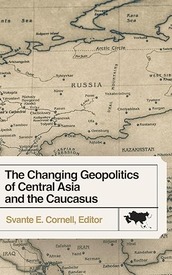The geopolitical environment surrounding Central Asia and the Caucasus has changed dramatically over the past decade, with important implications for American and European interests. Regional and great powers have accorded the region ever greater attention, and the regional states themselves have developed a greater agency in responding to the geopolitical challenges confronting them. European, and in particular American, perceptions of the region have not kept up with these changes and are in need of updating.
In this book, distinguished scholars move the discussion forward in 15 areas:
China's Ascent in Central Asia and the Caucasus
Russian Strategy Towards the Caucasus and Central Asia
Iran's Policy toward the Caucasus and Central Asia
The Dawn of Turan
The EU'S Growing Presence in Central Asia and the Caucasus
India's Changing Approach towards Central Asia and the Caucasus after the Afghanistan Debacle and the War in Ukraine
Japan as no "other"
Bureaucratic Morass and Conceptual Pitfalls: America's Approach to Central Asia and the Caucasus
Azerbaijan's Strategic Patience in a Changing World
Georgian Foreign Policy Strategy in Uncertain Times
Between Scylla and Charybdis: Kazakhstan's Foreign Policy in Pursuit of a New Equilibrium
Kyrgyzstan and the Changing Geopolitics of Central Asia
Turkmenistan Lifts Its Head
Uzbekistan 2.0: Continuity and Change in Foreign Policy
Implications for Policy
Contributors are:
Ariel Cohen, Ph.D., is a senior fellow at the International Tax and Investment Center (ITIC) where he heads the Energy, Growth, and Security Program.
Svante E. Cornell is Director of the Central Asia-Caucasus Institute & Silk Road Studies Program, a Joint Center affiliated with the American Foreign Policy Council, and the Institute for Security and Development Policy in Stockholm.
Timur Dadabaev is Professor of International Relations and the Director of the Special Program for Japanese and Eurasian Studies at the Graduate School of Social Sciences and Humanities, University of Tsukuba.
Shairbek Dzhuraev is the co-founder and president of Crossroads Central Asia, and currently a Volkswagen Foundation postdoctoral research fellow at the OSCE Academy in Bishkek.
Kornely Kakachia is Professor of Political Science and Jean Monnet Chair at Ivane Javakhishvili Tbilisi State University, Georgia, and Director of the Tbilisi-based Georgian Institute of Politics.
Halil Karaveli is a Senior Fellow with the Central Asia-Caucasus Institute & Silk Road Studies Program Joint Center, and Editor of Turkey Analyst.
Nargis Kassenova is a Senior Fellow at the Program on Central Asia, Davis Center for Russian and Eurasian Studies, Harvard.
Raffaello Pantucci is a Senior Fellow at the S. Rajaratnam School of International Studies, and a Senior Associate Fellow at the Royal United Services Institute for Defence and Security Studies.
Gulshan Sachdeva is Jean Monnet Chair and Coordinator Jean Monnet Centre of Excellence, School of International Studies at Jawaharlal Nehru University, New Delhi.
Brenda Shaffer is a research faculty member of the US Naval Postgraduate School. She also is a senior advisor for energy at the Foundation for Defense of Democracies and a senior fellow at the Atlantic Council's Global Energy Center.
S. Frederick Starr, Ph.D., is the founding Chairman of the Central Asia-Caucasus Institute, and Distinguished Fellow with the American Foreign Policy Council.
Farkhod Tolipov is Director of the Non-Governmental Research Institution "Knowledge Caravan," Tashkent, Uzbekistan.
Anar Valiyev, Ph.D., is Associate Professor as ADA University in Baku, Azerbaijan.
Inara Yagubova is a Senior Research Fellow at the Institute for Development and Diplomacy in Baku, Azerbaijan.

